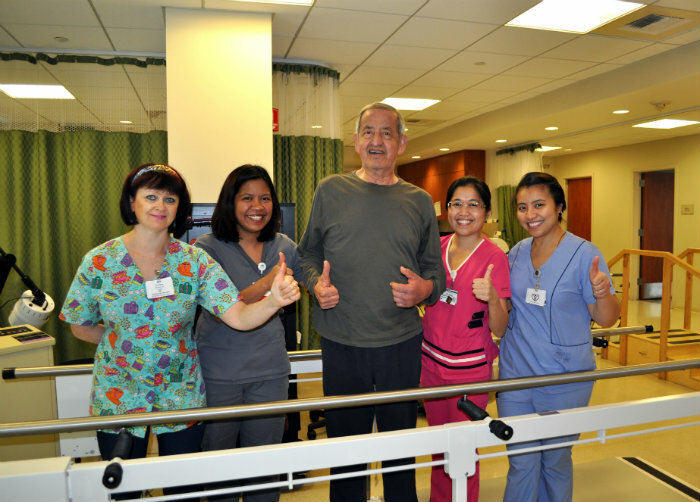Dedication and Support: A Prescription for Recovery


Dedication and Support: A Prescription for Recovery

Short-term in-patient rehabilitation is often a critical factor in recovery after an illness, injury, medical procedure, or hospital stay. Conditions requiring this type of specialized care may include joint replacement rehab, orthopedic post-hospitalization care, stroke and neurological rehab, post-medical and post-surgical recovery, and adaptive equipment instruction and conditioning.
For Fernando Carrillo, it was a stroke that eventually brought him to the Transitional Care Unit (TCU) at the Los Angeles Jewish Home. At 66, Fernando is an active man, working fulltime as a buyer in a downtown LA store, exercising at the gym regularly, and enjoying two mile walks and trips to Las Vegas with Lucia, his wife of 14 years. After spending 10 days in the hospital, he was brought to the Home for rehab. With the left side of his body completely effected by the stroke, Fernando spent the first two weeks in rehab in bed, unable to move. “I was also a little confused and had difficulty speaking, eating, and swallowing,” he recalls. His brain returned to full function quickly, and within 10 days he was able to eat and swallow.
As he began physical therapy, Fernando’s first question was: How long is it going to take you to fix me? The answer from his inter-disciplinary team: That’s all up to you! “I move fast. I don’t like to sit around and do nothing,” says Fernando. “I was committed to working hard and doing everything I could to improve. And the daily encouragement and support I received from everyone was fantastic!”
By the end of the first month, Fernando was able to lift his left leg. Two weeks later, he could lift his left arm. Now he can reach out with it. “The first day I could stand up and take a step, we all cried,” he shares emotionally.
After 100 days in short-term rehab at the Jewish Home, Fernando was ready to return to his home and Lucia. “When I came here I couldn’t even move. Considering what I can do now, it’s hard to believe,” Fernando says as he stands and takes several steps. “I consider myself to be at 50% now, and my goal is to be at 90% in five months.”
Before leaving TCU, Fernando was referred by his physician to receive in-home physical therapy, and he chose Jewish Home Care Services as his provider… “of course!” After that he will receive outpatient physical therapy as he continues working toward his goal.
The rehab team receives the highest marks from Fernando. “This wonderful team has all my respect. I have never seen a group of people so devoted to what they do. If someone is in need of rehab care, they should come here!”
Marina Balabanov, DPT and facility rehab director for the Joyce Eisenberg-Keefer Medical Center (JEKMC) at the Home, offers some insight into what makes their team so successful. “Each rehab program is individually designed by a supervising physical therapist, taking into consideration the patient’s medical history, current medical problem, and prior and current functional status,” she explains. “These programs are reviewed weekly with consideration of new ideas and recommendations from team members. We have state-of-the-art rehab equipment that helps us implement our programs, provide very high quality care and services, and achieve patient-oriented goals.”
The members of Fernando’s rehab team worked diligently to help him return to his home and his life. It was truly a group effort, and the bonds formed are strong, with each person feeling invested in his improvement. “It’s a testament to Mr. Carrillo’s 100% commitment and the dedication of our rehab staff to see such incredible improvement,” says Ilana Grossman, executive director of JEKMC.
At the Jewish Home, the approach to recovery and wellness combines onsite medical care, prescribed therapies, personal coaching and counseling, and excellent nutrition. We direct all efforts toward promoting healing, building confidence, and restoring independence. For more information, please call Connections to Care, our toll-free hotline, at (855) 227-3745 or visit our website at www.lajh.org.